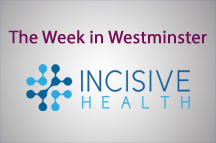 This week was all about the Government doing its best to keep calm and carry on. Or as May put it on Monday, it was a week to show that the Government – despite having lost its majority and not knowing for certain that it has the votes to pass its legislative programme – is getting on with the job.
This week was all about the Government doing its best to keep calm and carry on. Or as May put it on Monday, it was a week to show that the Government – despite having lost its majority and not knowing for certain that it has the votes to pass its legislative programme – is getting on with the job.
Wednesday’s Queen’s Speech was naturally dominated by Brexit, with a Repeal Bill to convert EU regulations into UK law and further bills on trade, customs, immigration, fisheries, agriculture, nuclear safeguards and international sanctions. In that sense at least, this was very much the kind of Queen’s Speech we might have expected had the General Election delivered the bumper majority that May had hoped for.
Whatever you call it – “hard”, “clean”, or even “red, white and blue” – the Conservatives (and, whisper it, Labour too) are still committed to delivering Brexit. However, the real question was, and remains, all about the detail. With Cabinet ministers striking different tones on issues like immigration, jobs and living standards, this week didn’t shed any further light on what Brexit will mean. But with Article 50 triggered and David Davis kicking off negotiations on Monday we might not have long to wait. Or as Mark Carney, the Governor of the Bank of England, put it in his Mansion House Speech “before long, we will all begin to find out the extent to which Brexit is a gentle stroll along a smooth path to a land of cake and consumption”.
If the Government’s position on Brexit had a semblance of business as usual, it was on the domestic front that we got a real sense of May’s fall from grace. A raft of manifesto pledges were junked as part of a ‘barnacles off the boat’ legislative programme. Gone were plans to expand grammar schools, cut free school meals, cap energy prices and means test winter fuel payments.
 Similarly, the proposal to reform social care funding – labeled a ‘dementia tax’ by critics - was absent from the programme. Instead, the Government promised to work to improve social care and to bring forward proposals for a public consultation. The potentially less controversial proposal to legislate to replace the Mental Health Act managed to make it into the Speech but the accompanying briefing materials only went so far as to commit to non-legislative measures.
Similarly, the proposal to reform social care funding – labeled a ‘dementia tax’ by critics - was absent from the programme. Instead, the Government promised to work to improve social care and to bring forward proposals for a public consultation. The potentially less controversial proposal to legislate to replace the Mental Health Act managed to make it into the Speech but the accompanying briefing materials only went so far as to commit to non-legislative measures.
This was very much a minority government’s Queen’s Speech then. The Government will naturally hope to avoid legislating as far as possible and will seek to build consensus on proposals like banning letting agents from charging tenant fees and tackling the gender pay gap.
What will make this difficult to achieve is that May’s Government can’t actually avoid controversial legislation. Managing Brexit bills through a recalcitrant Tory party, where it will require only four Conservative MPs to vote against or even abstain for the Government to lose its effective majority, will be an unenviable task. While Labour, emboldened by their surprise election performance will take every opportunity to cause trouble where they can. With the clock ticking, the Government simply can’t afford to lose votes on Brexit, which means there’s every possibility of another General Election sooner rather than later.
And with the prospect of another General Election on the horizon, classic domestic issues of schools and hospitals have been making headlines this week. On Tuesday, the Guardian reported on a leaked NHS document warning of patients being denied treatment, waiting times for operations lengthening and hospitals downgraded or closed in the capital because of funding cuts. While on education, head teachers from more than 4,000 schools across the country sent letters home to parents warning of a "growing crisis in our schools" and urging them to lobby their MPs to back more funding for the education sector.
But beyond all the sound and fury of Brexit, austerity and talk of another general election, Philip Hammond’s annual Mansion House speech made clear that the facts of economic life are unchanged. Simply put, more spending on public services will have to be paid for. So more money for the NHS, schools or the police means either more taxes, more borrowing or more growth. This week showed that if general elections are bad times to have debates about taxing and spending – a hung Parliament, no matter how long it lasts, might be even worse.














